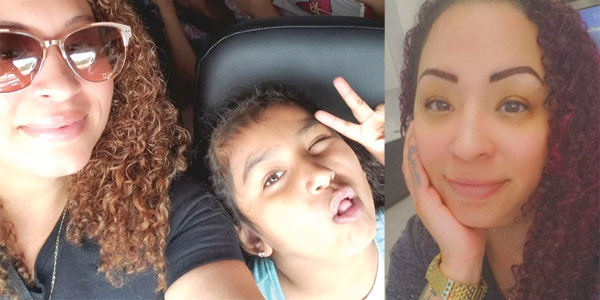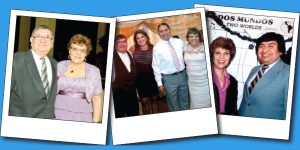
Interview by Tere Siqueira
Antonia Maciel is among those people who have contracted the coronavirus (COVID-19).
She also is among those people who have recovered from it.
Recently, the Kansas City area resident and mother of four, who got infected at work, shared her insights about overcoming COVID-19.
Dos Mundos: Share with us your experience with the coronavirus.
Antonia Maciel: I started having a cough, but as I suffer from allergies, … I let it pass. Later, I got a fever and started feeling down. I also found out that someone from work was sick, so I went to the hospital. They told me that in two days they … (would) let me know if the result was positive. If it was negative, they (said they) wouldn’t contact me. They told me that I needed to be on quarantine.
I didn’t go to work and I stayed home, and that night I started to feel really bad. I was shaking, my body hurt, … I couldn’t breathe. After two days, they called me and confirmed that I had (the) coronavirus. They also told me I needed to go to the hospital because they needed to register me and check how advanced (the disease) was.
DM: What were the symptoms?
AM: You know your body, so you notice that something isn’t good. I lost a lot of weight. My stomach hurt. I had a cough, fever and couldn’t breathe. I experienced a really strong … (headache) and … (ear) pain.
DM: How was the experience in the hospital?
AM: The hospital was prepared. They had an area for people suffering from COVID-19 and from those experiencing the symptoms. Inside the white room, doctors and nurses are using a special suit to protect themselves. I never experienced anything like that. They put a tube inside my throat and they used oxygen to help me breathe. I have been sick before, … I (have) even had surgeries, but this was very different. It’s something really bad. I hope that people going through this get better soon.
DM: How did you react to the positive test?
AM: When I received the news, I started crying. I was afraid that my children and husband were also sick. I was really afraid. I felt like I put my children’s lives in danger. My parents were worried, as they … (were) seeing on the news that people … (were) dying from it, but you … (could) also survive. The key is not to wait. It’s about receiving attention quickly.
DM: Did the doctor explain why you got sick?
AM: They only told me that, because my coworkers were sick, I was also going to be sick. They told me there wasn’t any treatment. Doctors could only stabilize the symptoms and made me take Tylenol and Vitamin C.
DM: How was the experience at your home?
AM: I had to be in a room, apart from everyone. We have a two-floor house, so my family was on the … (upper) floor and I was downstairs. The whole time, I had to stay inside the room and use my own bathroom.
DM: How did you feel emotionally?
AM: I was impatient. I don’t like to be in the house without doing anything, but my body felt bad. My body needed to rest, … so I slept a lot. For the first five days, I didn’t eat almost anything. When I ate, my stomach hurt. I couldn’t taste flavors in the food. I couldn’t smell anything. I lost my taste and smell senses. I believe that depression hit me. I was thinking about how long it would take for my life to get back to normal. I was worried about having to stay inside my room alone.
DM: How was the recovery process?
AM: I recovered after seven days, but I had to stay in the room for seven additional days. The … (seventh day), I felt good, I didn’t have any more symptoms. I called the doctors and they told me I had to stay in quarantine … (another) two weeks. Then, they allowed me to go back to do my home office work.
DM: How does the checkout with the doctors work?
AM: Everything is (done) over the phone. They do this as a measure to avoid risking your (life) and other people’s lives.
DM: Can you get sick with (the) coronavirus again?
AM: Doctors told me they don’t know. They haven’t had a patient that relapsed on (the) coronavirus. However, as this is really new, they don’t know for sure. According to CDC (U.S. Centers for Disease Control and Prevention) guidelines, I’m good.
DM: How did your life change after the COVID?
AM: I have to use an inhaler to help me breathe. But they told me that this … (would) be temporary. Like everyone else, I have to work from home. I also need to be a teacher for the kids. This affects us because we … (cannot) go to do fun stuff. We have to come up with games to keep the children entertained. We can’t do anything. Even if we feel like we are in jail, we need to understand that is for our good.
DM: What advice would you give to people?
AM: Stay home, … don’t go out. Keep (your) children at home. Try to not touch stuff at the store. … (Use) social … (distancing) and (take) a shower whenever you go back home. Remember that you don’t know if it’s on your clothes and you may be bringing it inside.
Maciel and her friend, Carolina Rico, are selling T-shirts to donate the earnings to people who are affected by the coronavirus. The T-shirts are $15 each. To buy a T-shirt, contact them at Facebook https://www.facebook.com/kcmodsgear/ or at kcmodgear@gmail.com.
_______________________________________________________________________________________________________________
Paciente del área comparte su historia de recuperación del coronavirus
Antonia Maciel se encuentra entre las personas que contrajeron el coronavirus (COVID-19).
Pero también está entre las personas que se han recuperado.
Recientemente, la residente del área de Kansas City y madre de cuatro hijos, que se infectó en el trabajo, compartió detalles sobre cómo superar COVID-19.
Dos Mundos: Comparte con nosotros tu experiencia con el coronavirus.
Antonia Maciel: Empecé a tener tos, pero como sufro de alergias, lo dejé pasar. Más tarde, tuve fiebre y comencé a sentirme deprimida. También descubrí que alguien del trabajo estaba enfermo, así que fui al hospital. Me dijeron que en dos días … me harían saber si el resultado fue positivo. Si era negativo, dijeron que no me contactarían. Me indicaron que necesitaba estar en cuarentena.
No fui a trabajar y me quedé en casa, y esa noche empecé a sentirme realmente mal. Estaba temblando, me dolía el cuerpo … no podía respirar. Después de dos días, me llamaron y confirmaron que tenía coronavirus. También me dijeron que tenía que ir al hospital porque necesitaban registrarme y verificar que tan avanzada estaba la enfermedad.
DM: ¿Cuáles fueron los síntomas?
AM: Conoces tu cuerpo, entonces notas que algo no está bien. Perdí mucho peso. Me dolía el estómago. Tenía tos, fiebre y no podía respirar. Experimenté un dolor muy fuerte de cabeza y oído.
DM: ¿Cómo fue la experiencia en el hospital?
AM: El hospital estaba preparado. Tenían un área para personas que sufren de COVID-19 y para aquellos que experimentan los síntomas. Dentro de la sala blanca, los médicos y las enfermeras usan un traje especial para protegerse. Nunca experimenté algo así. Me pusieron un tubo dentro de la garganta y usaron oxígeno para ayudarme a respirar. He estado enferma antes, incluso he tenido cirugías, pero esto fue muy diferente. Es algo realmente malo. Espero que la gente que pasa por esto mejore pronto.
DM: ¿Cómo reaccionaste a la prueba positiva?
AM: Cuando recibí la noticia, empecé a llorar. Tenía miedo de que mis hijos y mi esposo también estuvieran enfermos. Estaba muy asustada. Sentí que ponía en peligro la vida de mis hijos. Mis padres estaban preocupados, ya que… estaban viendo en las noticias que la gente … estaba muriendo por eso, pero también puedes sobrevivir. La clave es no esperar. Se trata de recibir atención rápidamente.
DM: ¿Te explicó el médico por qué te enfermaste?
AM: Solo me dijeron que, debido a que mis compañeros de trabajo estaban enfermos, yo también iba a estar enferma. Me dijeron que no había ningún tratamiento. Los médicos solo pudieron estabilizar los síntomas y me hicieron tomar Tylenol y Vitamina C.
DM: ¿Cómo fue la experiencia en tu casa?
AM: Tenía que estar en una habitación, aparte de todos. Tenemos una casa de dos pisos, así que mi familia estaba en el piso superior y yo estaba abajo. Todo el tiempo tuve que quedarme dentro de la habitación y usar mi propio baño.
DM: ¿Cómo te sentiste emocionalmente?
AM: Estaba desesperada. No me gusta estar en la casa sin hacer nada, pero mi cuerpo se sintió mal. Mi cuerpo necesitaba descansar … así que dormí mucho. Durante los primeros cinco días, no comí casi nada. Cuando comí, me dolía el estómago. No podía sentir sabores en la comida. No podía oler nada. Perdí los sentidos del gusto y el olfato. Creo que la depresión me golpeó. Estaba pensando cuánto tiempo tomaría para que mi vida volviera a la normalidad. Estaba preocupada por tener que quedarme sola en mi habitación.
DM: ¿Cómo fue el proceso de recuperación?
AM: Me recuperé después de siete días, pero tuve que permanecer en la habitación durante siete días más. El séptimo día, me sentí bien, no tuve más síntomas. Llamé a los médicos y me dijeron que tenía que quedarme en cuarentena otras dos semanas. Luego, me permitieron volver a hacer mi trabajo de oficina en casa.
DM: ¿Cómo funciona el chequeo con los médicos?
AM: Todo es por teléfono. Lo hacen como medida para evitar arriesgar tu vida y la de otras personas.
DM: ¿Puedes volver a enfermarte con (el) coronavirus?
AM: Los médicos me dijeron que no lo saben. No han tenido un paciente que recayera. Sin embargo, como esto es realmente nuevo, no lo saben con certeza. De acuerdo con las pautas de CDC (Centros para el Control y la Prevención de Enfermedades de EE. UU.), estoy bien.
DM: ¿Cómo cambió tu vida después del COVID?
AM: Tengo que usar un inhalador para ayudarme a respirar. Pero me dijeron que esto sería temporal. Como todos los demás, tengo que trabajar desde casa. También necesito ser maestra para los niños. Esto nos afecta porque nosotros … no podemos hacer cosas divertidas. Tenemos que inventar juegos para entretener a los niños. No podemos hacer nada. Incluso si sentimos que estamos en la cárcel, debemos entender que es para nuestro bien.
DM: ¿Qué consejo le darías a la gente?
AM: Quédate en casa, no salgas. Mantén a tus hijos en casa. Intenta no tocar cosas en la tienda. Practica el distanciamiento social y toma una ducha cada vez que regreses a casa. Recuerda que no sabes si está en tu ropa y es posible que la lleves adentro.
Maciel y su amiga, Carolina Rico, están vendiendo playeras para donar las ganancias a las personas afectadas por el coronavirus. Las playeras cuestan $15 cada una. Para comprar una, contáctelas en Facebook https://www.facebook.com/kcmodsgear/ o en kcmodgear@gmail.com.










